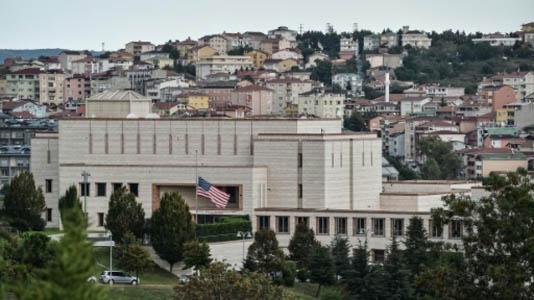ISTANBUL, March 26, 2019 (BSS/AFP) – A Turkish court on Tuesday starts the
trial of a US consulate staffer accused of spying and attempting to overthrow
the government in one of several cases fuelling tensions between the United
States and its NATO ally.
Metin Topuz, a Turkish citizen and liaison with the US Drug Enforcement
Administration, was arrested in 2017 and has been accused of ties to US-based
preacher Fethullah Gulen who Ankara says ordered a failed 2016 coup.
The trial begins as relations between the United States and Turkey have
worsened with disagreements over Syria’s war, Turkey’s purchase of Russian
missiles and the US refusal to extradite Gulen.
The first hearing of Topuz’s trial in Caglayan court in Istanbul is
expected to last three days. He faces life in jail if found guilty of spying
and plotting to overthrow the government.
The US embassy has called the accusations “wholly without merit”.
US officials say freeing “unjustly detained” Turkish nationals on their
staff is a priority, as is the case of NASA scientist Serkan Golge, a dual
US-Turkish national jailed on terror charges.
Another Istanbul local consulate staffer, Mete Canturk, is under house
arrest and facing similar charges to Topuz.
A judge in January convicted Hamza Ulucay, a former local employee of the
US consulate in Adana, southern Turkey, of helping outlawed Kurdish
militants. He was released for time already served.
– Diplomatic crisis –
Topuz was formally charged in January. He is accused of contact with police
officers and a former prosecutor suspected of links to the Gulen movement,
according to Anadolu state news agency.
His initial arrest in 2017 triggered a diplomatic crisis with both Turkey
and the US suspending visa services, until they stepped back.
“This has been a big deal in the Turkish-US relations, but Americans have
reversed course from an earlier decision to impose visa bans and have decided
to pursue a quiet diplomacy,” said Asli Aydintasbas, a fellow with the
European Council on Foreign Relations.
Since the failed 2016 coup against Erdogan, tens of thousands of people
have been detained over suspected links to Gulen and more than 100,000 people
have been sacked or suspended from public sector jobs. Gulen denies the coup
accusations.
Ankara has been criticised by its Western allies and human rights activists
over the crackdown they say has undermined democracy. But Turkish officials
say the raids are needed to clear Gulen’s influence from state institutions.
US relations with Turkey plummeted to a low last year over detained US
pastor Andrew Brunson, triggering tit-for-tat sanctions that hit the local
lira currency.
Brunson was released in October last year and relations improved.
But Erdogan’s decision to buy S-400 missile systems from Russia has
provoked warnings from Washington that the deal may impact its sale of US-
made F-35 fighter jets to Turkey and trigger more sanctions.
Turkey’s push to buy the systems has raised questions among NATO allies
over alliance equipment as well as concerns over the relationship between
Erdogan and Russian President Vladimir Putin.
Ties were already been strained over US support of Kurdish forces in Syria,
which Ankara brands as a terrorist group tied to PKK Kurdish militants
fighting an insurgency against the Turkish state.



